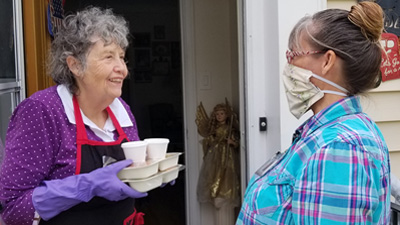
Demand for meals, cost to deliver them increases due to COVID
Even before the pandemic, Meals on Wheels was critical to Sharron Miller, who at 72 has a degenerative bone disease that makes moving around painful. Her husband relies on a walker. Both have failing eyesight.
“By 3 or 4 in the afternoon, I can hardly move,” Miller said. “This food, this program, is a godsend.”
Now the couple’s age and medical conditions make it even more important to stay home. For the Millers and many others, the personal support systems in their lives are shrinking at a time they need it most.
The demand for Meals on Wheels quickly grew from an average of 350 people receiving meals every weekday to 425 – an extra 2,000 meals a month.
“There’s an awful lot of need,” Aging Services Director Kim Thiel-Schaff said. “It’s been daunting, but so far, we’ve managed to figure it out.”
Meals on Wheels didn’t miss a day as the state closed down services starting in mid-March. The nonprofit immediately changed its treasured practices – no more coming inside homes for a quick chat and no more hugs as greetings.
“People are really concerned about leaving home,” Thiel-Schaff said. “And as the cases in Cascade County start to creep up, we can see people starting to want services more. “We couldn’t do this without United Way help. We are so grateful for every dollar we’ve gotten.”
All Meals on Wheels staff wear masks, and meals are often left in coolers set out by clients at the door, or hung in plastic sacks on the door knob. And instead of warm meals every weekday, now drivers deliver on Mondays, Wednesdays and Fridays, bringing three warm meals and two frozen ones.
Meals on Wheels program manager Teresa Loftus said at first drivers mostly knocked on the door, stepped away and briefly checked to make sure the person was OK. As time wore on, it became clear that conversation was as needed as the meals.
“Human contact is so critical now,” Loftus said. “To take the time to talk over the fence with someone really makes a difference.” Just as the need increased due to the coronavirus, safety measures needed to protect senior clients caused costs to increase.
Meals on Wheels relied on nine to 12 volunteers to deliver daily meals – most of whom were in their 60s, 70s and even 80s. The nonprofit now calls on Cascade County Aging Services employees and other county employees to help in the kitchen and with deliveries.
Along with needing more food, Meals on Wheels needed more food trays and other paper supplies.
Staff take extra time after deliveries are made to make phone calls to check on anyone who didn’t answer their doors – even tracking them down with family or calling their doctors to make sure they are all right.
Two weeks ago, a Meals on Wheels deliverer heard cries for help through a cracked window. The client had fallen the night before. The door was locked, but the Meals on Wheels driver called for help and an EMT was able to get inside and take the client to the hospital.
“For some people the Meals on Wheels staff are the only people they see throughout the day,” Thiel-Schaff said. “This is hard on folks, they are scared to death. We’re their lifeline.”
Meals on Wheels is one of 34 local nonprofits programs that receive United Way grants from money raised in United Way’s fall fundraising campaign. Many people give through an employee campaign, which runs through the end of the year. People also may give by sending contributions directly to United Way at PO Box 1343, Great Falls, MT 59403 or donating online via their secure website at www.uwccmt.org.
